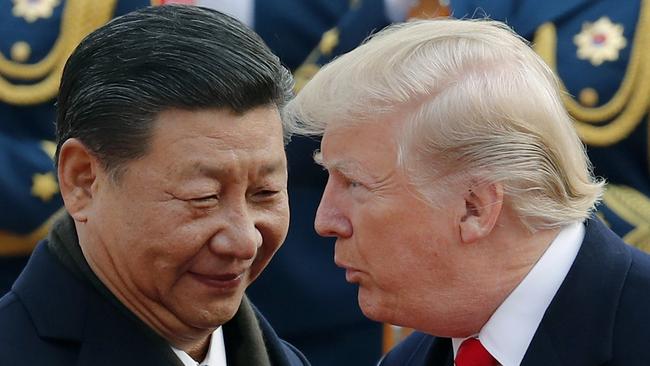China trade war ‘will only get worse’, Trump warns
Fears that there is no end in sight to the growing trade war between the US and China have rocked Wall Street.

Fears that there is no end in sight to the growing trade war between the US and China have rocked Wall Street and global markets after Beijing announced retaliatory tariffs on $US60 billion ($99bn) of US goods.
The Chinese move was made in response to Donald Trump’s decision last week to levy US tariffs on a further $US200bn of Chinese goods. Beijing’s decision also follows the failure of trade talks between Chinese and US officials in Washington late last week to strike an agreement to end the year-long dispute.
GOTTLIEBSEN: A prolonged US-China trade dispute will hit Australia harder than any other developed nation
But the President responded defiantly, saying the US economy was in a stronger position than China’s to withstand the trade dispute and that China would be the ultimate loser.
“China has been taking advantage of the US for many years ... we can’t let that happen. We are in a very strong position ... I love the position we are in, I think it’s working out really well,” he said.
With no short-term prospect of a resolution to the tit-for-tat tariffs war, investors sent the Dow Jones index plunging by more than 700 points at one stage before ending down 617 points, or 2.38 per cent, its worst fall since January 3.
Beijing said it would raise tariffs on about $US60bn of US goods, with Foreign Ministry spokesman Geng Shuang declaring: “China will never succumb to foreign pressure.”
Mr Geng said that raising tariffs would not solve problems but that China would always defend itself. “We are determined and capable of safeguarding our legitimate rights and interests. We still hope that the US will meet us half way.”
Beijing will raise tariffs between 5 and 25 per cent on US imports from June 1, hitting textiles, coffee and beef and goods such as microwaves and solar batteries.
“China should not retaliate — will only get worse,” Mr Trump tweeted. “There will be nobody left in China to do business with. Very bad for China. Very good for USA.”
The President said he had not yet decided whether he would take the next step of imposing taxes on the remaining $US325bn of Chinese imports.
“I have not made that decision yet,” he said.
Such a move would further spook global markets but is unlikely in the short term while both nations continue to try to negotiate a resolution.
Mr Trump said he planned to meet face-to-face with China’s President, Xi Jinping, at the G20 summit in Japan next month.
The President has claimed that the tariff war is a good thing for the US economy, although Mr Trump’s chief economic adviser, Larry Kudlow, conceded this week that US consumers were paying the cost of the increased tariffs.
“In fact, both sides will pay. Both sides will pay in these things,” Mr Kudlow said.
Wall Street was further spooked by analysis from Goldman Sachs that said tariffs were directly impacting US businesses, consumers and the economy.
“The costs of US tariffs have fallen entirely on US businesses and households, with no clear reduction in the prices charged by Chinese exporters,” Goldman Sachs told investors. It said “the effects of the tariffs have spilled over noticeably to the prices charged by US producers competing with tariff-affected goods”.
Trade talks between the US and China broke down early this month after the US accused China of reneging on commitments to change its laws to remove a series of unfair trading practices.
Mr Trump responded by ordering tariffs on a further $US200bn of Chinese goods, a move which has now led China to respond with its own new tariffs. His trade war with China follows pledges he made during his 2016 campaign when he said the large trade deficit with China was unfair and damaging. He promised to challenge China on trade to reduce the trade deficit and also pressure Beijing to reform its trading practices.
Cameron Stewart is also US Contributor for Sky News Australia





To join the conversation, please log in. Don't have an account? Register
Join the conversation, you are commenting as Logout